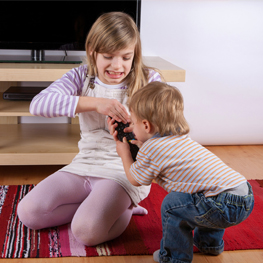



It can be frustrating and embarrassing when your typically sweet little child refuses to share. Fortunately, this is totally normal and there are things you can do to help. Sharing is a complicated social skill that your child will learn with the help of your guidance and plenty of practice.

Starting your baby on solid foods is an exciting milestone that can be fun and messy and, like most new things in parenting, comes with lots of questions. Here are some common questions and answers to help your baby get off to a healthy start with solids.

Your newborn is a unique person and will present you with a very individualized language. However, there are many similarities among babies. The majority of newborns signal tiredness in similar ways. Let’s talk about some of these common signals to give you a guideline as you begin the process of learning to read your baby’s language. Once you get through the first few months, you won’t need a list of any kind as you will learn how to read your baby better than anyone else in the whole entire world. But in the meantime, knowing what things to look out for can speed the translation process.

Sitting beside your baby in the NICU can bring an array of emotions for parents. Seeing your child hooked up to machines with wires attached to their body can be scary and overwhelming. The majority of babies are in the NICU due to premature birth (born prior to 37 weeks gestation), but babies can be admitted for other reasons such as breathing problems, low birth weight, heart conditions, and other complications. This experience can bring a variety of emotions that are normal yet often confusing.
Calgary’s Child Magazine © 2024 Calgary’s Child